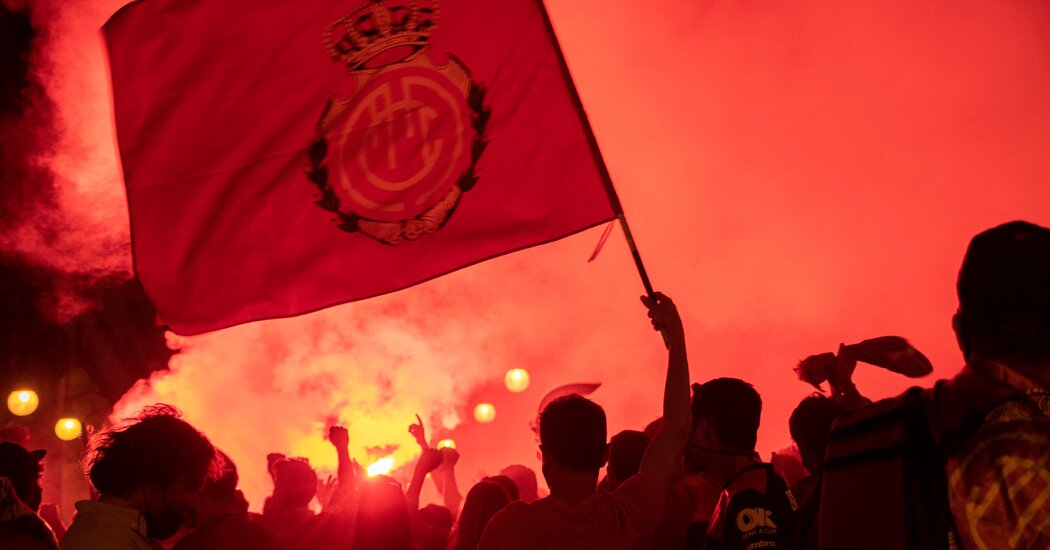Graeme Le Saux spent the last year mapping out two futures.
In one, the club he helps run, Real Mallorca, would remain in Spain’s second division. Its budget would be halved, and difficult decisions would need to be made. Some players might have to be sold. Horizons would be lowered. That was, to borrow a term that has become familiar this last year, the worst-case scenario.
In the alternative — the best case — Real Mallorca would be promoted, back to the bright lights of La Liga. The club’s cash flow would increase, and increase considerably, as television revenue poured in. The team would have to be bolstered, rather than deconstructed. Ambition, though modest, would flutter through the club.
As a director of Mallorca, Le Saux saw the complication. It was, he said, a little like going to NASA and asking it either to put a satellite into orbit or to mount a fully-manned mission to Mars, but refusing to decide which until the day of departure. And you did not know the budget. Also, the same four people had to work on both projects. Le Saux was preparing for two futures that opened doors into divergent realities.
Like everyone at Mallorca, Le Saux is acclimatized to that sort of uncertainty. Five years ago, a group headed by Robert Sarver — the owner of the N.B.A.’s Phoenix Suns — bought the club as it languished, anchored by debt, in Spain’s second division.
The takeover attracted attention, at the time, because Sarver’s co-investors were not the usual faceless Wall Street types: they included Steve Nash, now the coach of the Brooklyn Nets, and Stuart Holden and Kyle Martino, both former United States internationals turned broadcasters.
Andy Kohlberg, once a professional tennis player, would serve as team president. Le Saux — a former Premier League winner and England international, now a mainstay of NBC’s soccer coverage in the United States — came on board a couple of years later, first as an adviser and then as a director.
It gave Mallorca the air of a grand experiment. Various teams in Europe — most notably Ajax and Bayern Munich — employ former players in front office or executive roles. But they are grand institutions, places bonded to longstanding traditions, more accustomed to trying to preserve tried-and-tested methods than forging new paths. Mallorca, by contrast, was effectively a blank slate. It was a chance to see what would happen if athletes could build a club in their own image.
In a way, the result is almost underwhelming. It turns out, if the athletes were in charge, they would be extraordinarily sensible. They would think long-term. They would devote considerable time and energy to building what Kohlberg calls “a winning culture,” though Le Saux generally prefers “identity.”
That is not to say their investment and interest is not commercially minded. Before the coronavirus pandemic, one of Mallorca’s great innovations was to introduce the first “tunnel club” in Spanish soccer, a place where corporate guests or well-heeled fans could pay a premium price for a premium seat, taking in the game while eating fresh-baked pizza and drinking cocktails.
It is the sort of idea that, in general, would be greeted with scorn and derision in many places in Europe: American owners trampling over the proud traditions of the game in an effort to make a quick buck. Kohlberg’s explanation, though, sounds eminently reasonable: It was a way of “segmenting the fan experience and the customer experience,” allowing ordinary fans to enjoy the game as they always have, while accepting that some people want to, well, eat pizza and drink cocktails.
Of far more concern to all of them is the way the sporting side of Mallorca is run. The principles are the same ones that bind most of Europe’s upwardly mobile teams: having a single, stylistic thread running from the first team down to the youth ranks; focusing on and investing in the academy, allowing the club to harvest homegrown talent; making coaching appointments with that vision in mind, rather than jumping at whoever happens to be fashionable or successful at the time.
It is not a particularly quick process. “It took 15 years with the Suns to build that culture,” Kohlberg said. It is not an absolute one, either. “It does not mean winning every year,” he said. “It means getting to the playoffs more often than not.” And it is not, crucially, one that has any shortcuts.
Soccer is obsessed with the idea that there is some sort of magic formula to success: that it can be wholly attributed to a manager’s decision to ride a bicycle or that team spirit can be developed by a particularly moist banana bread. Most famously, allowing players to eat ketchup is a crucial ingredient in both success and failure.
There is a reason for this: Trivia is imbued with explanatory power because the real difference between victory and defeat is long and painstaking and, deep down, not especially attention-grabbing.
“A winning culture starts with management and ownership, and then it is finding people who are consistent with that,” Kohlberg said. “Whether they are involved with training or nutrition or physiotherapy, they all have to buy in to it. And it means not continuing with people who don’t fit into that culture.”
Having an ownership group that instinctively understands that — that has experienced, firsthand, the sorts of environments that thrive and the sorts that do not — gives Mallorca an idea of what makes a difference, of what matters. The former professionals he can lean on, Kohlberg said, have an instinctive awareness of what a winning culture looks like.
And yet they know, too, that no matter how hard you work, how good you are, how many things you get right, nothing is guaranteed. Mallorca’s long-term vision might always have been in sharp focus, but its perspective has rarely been still. In the five years since Sarver and his group arrived, it has not played in the same division in consecutive seasons.
In the ownership group’s first full season, the club was relegated to the regionalized third tier of Spanish soccer. “That was a real shock to them, I think,” Le Saux said. “But they knew that they had to make it the best thing that ever happened to them.” The club was promoted back to the second tier a year later, and then jumped straight to La Liga, too. “I had to explain that it was a unicorn moment,” Le Saux said. “It was not the sort of thing that really happened.”
Mallorca narrowly fell short of retaining its place in the top flight last year. In the summer, it lost its chief executive, and its star forward effectively went on strike, trying to force a transfer.
It spent this season battling for promotion, confirming yet another change of status last month, with three games to go. Only at that point did Le Saux know what the future looked like. Rather than another year in orbit, Mallorca would be going to Mars. And it had about two months to prepare.
Many ownership groups would find that infuriating, proof of the ultimate irrationality of soccer. “We are trying to change the culture, the academy, the infrastructure, and that would be easier to do if we weren’t bouncing up and down,” Kohlberg said. Spanish soccer’s financial rules add to the complexity, since the owners are limited by what they are allowed to invest in the team.
Some, in that situation, might abandon their principles, seeking an immediate fix just to stabilize. Others might, perhaps, launch some sort of breakaway project, to try to abandon the possibility of relegation altogether. It would be a stretch to say that anyone at Mallorca has enjoyed the uncertainty. “It has been difficult, emotionally and financially,” Kohlberg said.
But it feels as if the athlete’s perspective is slightly different than the tycoon’s. Kohlberg takes great pride in having learned to be “nimble and conservative,” to foster an environment in which the club can take every twist and turn and yet never lose sight of its ultimate destination, or its preferred method of transport.
Like Le Saux, and Nash, and Holden — Martino has divested his interest in the club — Kohlberg understands that, sometimes, you do not win. Sometimes you try your best and it does not work out. “You can only control what you can control,” he said.
At the end of last season, once promotion was assured, Mallorca’s coach, Luis Garcia, decided to give a few of his lesser-used players a chance to take the field. “Not a weakened team,” Le Saux said. “Just a different team.” The club’s ultimate target already assured, the players might have felt able to go through the motions: Nothing, after all, was riding on these games.
Instead, Mallorca won twice and, with the season almost over, was on course not only to win promotion but to claim the championship. “We were three minutes away from winning the league,” Le Saux said.
Then its final opponent, Ponferradina, scored what Le Saux described as a “really good goal,” and that dream evaporated. He does not dress it up as bad luck, or claim the club was robbed of a glory that was its due. Sometimes, the other team scores a goal. Sometimes, in sport, you do not get what you want. You can only control what you can control. The athletes know that, even when they are in charge.
A Lack of Imagination
Carlo Ancelotti is back at Real Madrid. Massimiliano Allegri is back at Juventus. By those standards, Tottenham’s potential appointment of Antonio Conte, fresh from guiding Inter Milan to the Serie A title, would almost be dangerously novel. But whether Conte gets the job or not hinges, it seems, on whether Spurs can tempt Mauricio Pochettino to return from Paris St.-Germain.
Every summer brings a game of managerial musical chairs, but two things stand out about this edition. The first is the sheer scale of it. It is not just Real Madrid, Juventus, Inter and Spurs looking for new coaches, or even those teams — Everton, Lazio and (possibly) P.S.G. — who suddenly find themselves in need of a replacement, but a pattern across Europe.
There are still three Premier League jobs open, at Everton, Wolves and Crystal Palace. Roma, Napoli and Fiorentina all have new coaches. A majority of Bundesliga teams will go into next season under fresh leadership, and so will Lille, the French champion, and Lyon. It is verging on a complete reset.
Except that it is not, because — Germany aside — so many of the names are so intensely familiar. The second defining trait of this year’s coaching carousel, particularly at the elite level, is how uninspired so many of these appointments are. Ancelotti is a fine manager, one of the best of his generation, but his return to Madrid — which he led to the Champions League title in 2014 and which fired him a year later — is an absolute failure of imagination, of vision.
Juventus restoring Allegri is essentially an admission that the last two years have been a waste of everyone’s time. Spurs fired José Mourinho to find a coach with an expansive style and a belief in youth, and yet seem now to have fixated on Conte, who has neither, but does come with a thicket of championship medals around his neck.
Mourinho at Roma, Luciano Spalletti at Napoli, Gennaro Gattuso at Fiorentina — these are all experienced, gifted coaches, ones who do not deserve to be condemned to the scrapheap, who still have something to offer. But still: They are hardly redolent of some grand vision for how to compete for trophies or restore a club for glory.
Not one is a bold, daring choice, an effort to do something a little bit different, to see if there is another way. A stagnation has settled in, a risk aversion, one that will do nothing but perpetuate the status quo. This is a time for new ideas, but those ideas will not come from the same old faces.
Correspondence
A little nostalgia hit from Rod Auyang, who still “harbors a fondness for the ‘golden goal’ sudden death system for settling ties after 120 minutes,” rather than penalty shootouts. I quite liked the golden goal, too, though I’d like to see a slight amendment: maybe after every five minutes without a goal, each team loses a player?
Tim Fuller is of the same mind. “Play an unlimited series of 10-minute periods in extra time,” he writes. “The first goal in extra time would be a ‘golden goal’ that ends the game.” To stave off fatigue-related injuries, he has two suggestions: one is to remove a player from both teams every few minutes (good), and the other is to forbid even the goalkeepers using their hands (bad, but potentially quite funny).
Several of you, including Joey Klonowski and Chris Conant, got in touch to say that Chicago is very proud of its fire, thank you very much, and I am happy to stand corrected. Whether the city is proud of the Fire, I’m not sure. And thanks to Jim Blaney, for pointing out that while Naples Volcanoes is a bad name, Naples Lava is a brilliant one. My other suggestion would have been the Naples Pyroclastic Flow, but Jim’s is better.
And I loved this email from David Goguen, on the subject of authenticity. “I often let my 6-year-old son pick the matches we watch together,” David wrote. “The other day he chose a tie between Forward Madison [good name, needs punctuation] and Union Omaha.
“He was tickled when the Madison fans started squawking like flamingoes in support of their club. An original gesture, perhaps a bit ridiculous, but traditions have been forged through less. And I thought it fitted right in with the quaint stands, the bucolic trees behind, and the smoke from the vendors’ grills.
“It got me thinking about how every tradition has to start somewhere. There was a moment on Merseyside when the supporters heard ‘You’ll Never Walk Alone’ through the speakers for the first time, and maybe they were baffled. The first few times I heard FC Koln’s anthem I thought it was a lost track from Scorpions, but now it gives me chills. History has to start somewhere, and authenticity by it’s very definition can’t be faked. Here’s to real roots, however absurd, and more flamingos.”
(On the subject of Forward, Madison! I loved this piece, by the sometime Times contributor Leander Schaerlaeckens, on the trend toward original, innovative jerseys not only in M.L.S., but throughout the American soccer landscape. The Kingston Stockade number, for one, is lovely. But it will have to go some to beat what longtime readers will know is officially the best jersey ever produced.)
Source: Read Full Article






